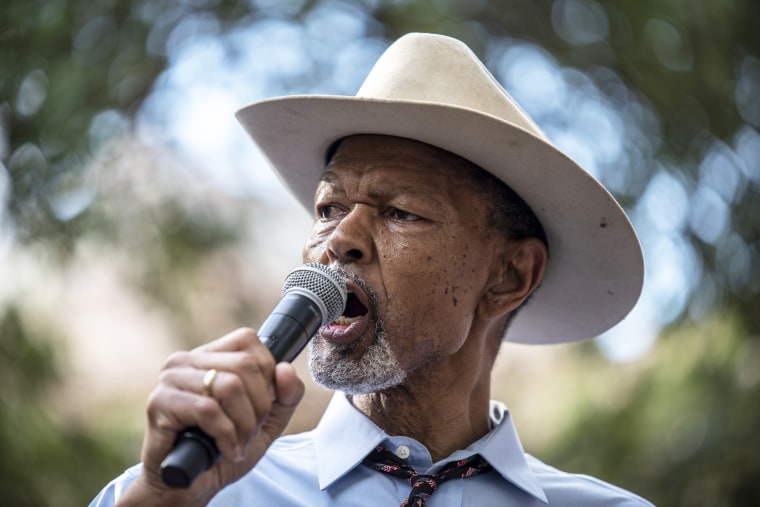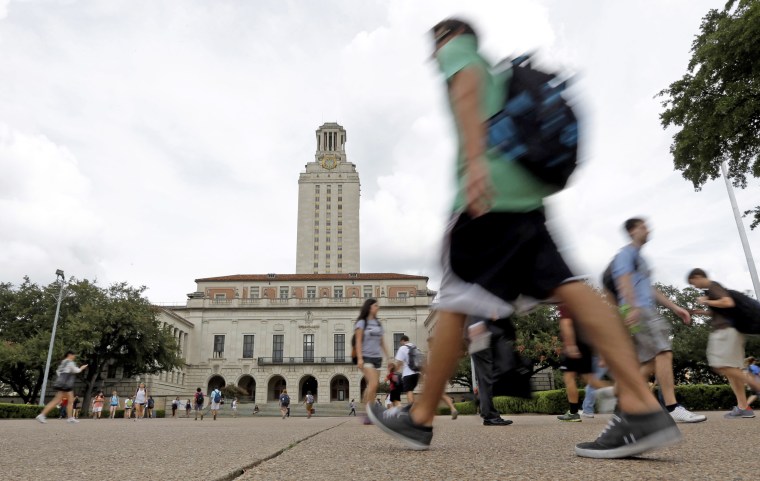Latino and Black leaders in Texas pushed back on claims that diversity and inclusion hiring programs are illegal as the vast University of Texas System put a hold on such programs at its institutions and campuses.
Kevin Eltife, chairman of the system's board of regents, announced Wednesday that he was delaying new policies on diversity, equity and inclusion (DEI) and launching a review of all of them. The announcement at a board meeting, with no discussion or vote, was reported first by The Austin American-Statesman.
Eltife, a former state senator appointed to the board by Abbott, also a Republican, said that within UT campuses “some DEI efforts have strayed from the original intent to now imposing requirements and actions that rightfully has raised concerns of our policy makers.”
No examples of DEI programs that have strayed were provided at the meeting or in response to an NBC News request.
Eltife’s stop on new policies follows a declaration by Abbott's chief of staff in a letter dated Feb. 4 to state agencies that DEI "has been manipulated to push policies that expressly favor some demographic groups to the detriment of others." The letter, first reported by The Texas Tribune and posted on Twitter by KHOU in Houston, went on to say that a state agency spending tax dollars to pay for DEI initiatives and resources connected with them is illegal.
That declaration from a higher education system of 13 institutions and more than 244,000 students is drawing pushback from Black and Latino lawmakers and organizations.
Gary Bledsoe, president of the Texas National Association for the Advancement of Colored People, said DEI programs are set up through legal departments and are conservative in nature so as not to run afoul of federal anti-discrimination laws.
"It is a complete misrepresentation to say that DEI programs are illegal and that they violate the Constitution or any statute, because they don't," said Bledsoe, who also is a founder of the Black and Brown Dialogue on Policy. The multiracial, cultural group seeks to confront what it says is a "growing threat of racism and policies meant to undermine our human dignity and humanity."

Bledsoe said NAACP and others are preparing civil rights complaints "because we think the action the governor has taken is discriminatory and that it leaves in place programs that benefit others but eliminates programs that have lifted Latinos and African Americans and other minorities."
Angela Valenzuela, a co-founder of the Black and Brown Dialogue on Policy, said DEI policies on hiring are guidelines and not all determining, "or we would have a more diverse faculty and we don't."
Universities in Texas, where Hispanics are estimated to be the largest population group, have struggled with hiring diverse faculty and reaching enrollment numbers that reflect the population. Compared to other flagship universities nationally, UT-Austin, the system's flagship, has the second-largest gap between the percentage of Latino students who graduate from the state's high schools (51%) and the percentage of Latinos that it enrolls as freshmen (29%), according to 2020 federal data.
Valenzuela noted that DEI programs are not only focused on race and ethnicity but also ensure the hiring and enrolling of veterans, people with disabilities, people in the LGBTQ community, older applicants and white working class and rural people. Valenzuela is a UT-Austin professor but emphasized she was commenting as a Black and Brown Dialogue on Policy co-founder.
State Rep. Christina Morales, a Democrat from Houston and vice-chair of the Mexican American Legislative Caucus, noted that 18% of Latinos have advanced degrees, compared with 39% of white Texans. In addition, 92% of white Texans have high school degrees, compared with 70% of Latinos, she said.
She said that Latino educational attainment has increased since 1965 when President Lyndon B. Johnson signed an executive order to reinforce the requirement that federal contractors not discriminate in employment.
"The effort has to be made that more people are included," Morales said. "Just human nature, we tend to pick people who look like us, have names like us and have a similar backgrounds, so it's important that we consciously choose people with a diverse background and we choose to include other folks when we are hiring and we admitting them to the university."
She said "we're incredibly disappointed" with the UT System decision and Texas A&M University, the flagship of the state's A&M System, for changing its hiring policies. But she also said she recognized that they are in a difficult place because their funding is at risk if they defy the governor.
Luke Macias, a Republican consultant, recently described diversity, equity and inclusion initiatives in a newsletter as "the vehicle by which the left is filling our universities and public schools with marxist ideas."
"When we talk about what DEI is, it is a university saying we need to cease recognizing people for the content of their character and not the color of their skin," Macias said, referring to a quote from Martin Luther King Jr. that his daughter, Bernice King, and some scholars say is often misused.
Macias credited Scott Yenor, a Boise State University political science professor whose remarks about the recruitment of women in some fields and other comments have drawn protest and criticism, for having "exposed" DEI policies in Texas as discriminatory.
The governor's actions on DEI hiring comes amid a Republican-led campaign targeting the teaching of racial, ethnic and LGBTQ studies in state schools and universities.
It also comes as potential 2024 Republican presidential candidates have begun to jockey for support from the party's right-wing base. Florida Gov. Ron DeSantis, considering a White House run, also is targeting DEI in his state.
Macias noted that anti-DEI efforts aren't stopping at hiring policies. He said DEI programs for other purposes in universities are not illegal, but the Texas Legislature is trying to pass laws to prohibit such programs.

